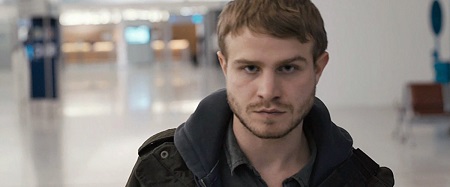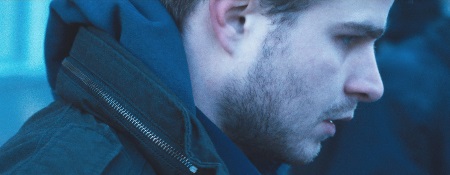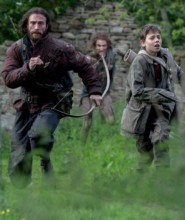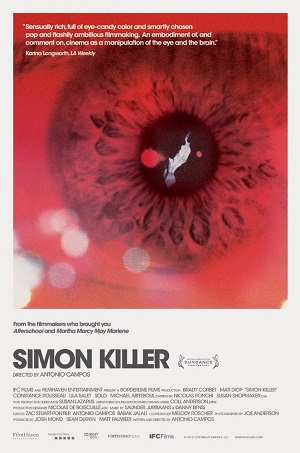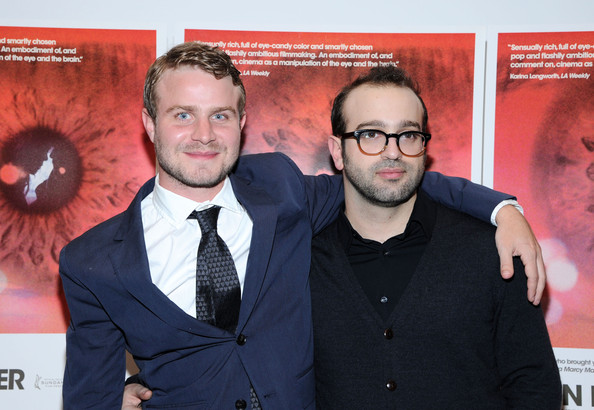
“Simon Killer” – Interview with Antonio Campos and Brady Corbet
by Sara Michelle Fetters - April 10th, 2013 - Interviews
Killer Noir
Director Antonio Campos and Actor Brady Corbet Give Simon Life
The less you know about writer/director Antonio Campos’ sophomore effort Simon Killer before going in the better. The basics are really all that’s necessary, the knowledge that twenty-something American Simon (Brady Corbet) is in Paris to get over the pain caused by the ending of a long-term relationship and that he makes a complicated, emotionally crippling friendship with local prostitute Victoria (Mati Diop) the basic narrative thrust.
It’s a gloriously dark film, disturbing in ways that get under your skin with unnerving precision. At the same time, the movie is also brazenly intelligent, filled with shifting situations, characters masquerading as the opposite of what they appear and bits of social commentary that are as brutal as they are incisive, Corbet and Diop, both of whom get co-story credits, delivering intricate, multifaceted performances impossible to forget.
I had the pleasure of speaking with both Campos and Corbet over the phone earlier this week. Here are some of the highlights from that conversation:
Sara Michelle Fetters: Antonio, this movie is pretty crazy on a lot of levels, definitely in many ways not what an audience is going to expect when entering the theatre. Where did the ideas for this come from? When did you know you not only wanted to work on this story, but also in do it in tandem with your two stars as far as the finished story/script was concerned?
Antonio Campos: I always knew I wanted to work with Brady again [after producing Martha Marcy May Marlene], but as far as my writing it came out of a lot of things but primarily out of the writings of Georges Simenon. I’d been interested in the noir world for quite some time, the books of Simenon and Jim Thompson and others, and I was interested in exploring those sorts of worlds in a contemporary way.
I came to Brady with this seed of an idea and we sat down and plotted out a specific outline. We knew we needed to find a female lead and came across Mati Diop. Brady and I knew immediately who she was through the film 35 Shots of Rum and were excited to meet her. Once she came on board, it was important that there be a woman’s voice involved, not only in her character but with the film as a whole. We all worked really well together and I think that’s represented by the tone and the complexity of the movie. That’s kind of how it all happened.
Sara Michelle Fetters: Brady, for you, when you’re tackling a character like this, one whose inner workings are so submerged and someone who isn’t exactly the most likeable of guys, what do you do to find all the pieces that make up who he is? What kind of challenge is that for you?
Brady Corbet: It’s all challenging, especially when you’re putting your body on the line and there’s so much nudity involved. But from inception I felt like I understood the character. I knew what the movie was about, what it was that we were exploring. Because I was involved right from the very beginning I never felt like I was out of the loop and thus couldn’t show up on the set fresh-faced and not knowing what to expect. I got Simon because I helped create him right at the start and that made playing him something I felt fully confident tackling.
Sara Michelle Fetters: The level of confidence you all had to have in one another while making this seems, to me at least, paramount to the picture’s eventual success or failure. The story you lay out is so ephemeral in nature and you leave a lot for the audience to piece together on their own. If this confidence hadn’t been there I’m not certain you could have pulled any of this off.
Brady Corbet: Yeah, I think you have something there. I agree with you and I think that’s a very lovely thing to say. Antonio and I worked together in various capacities over the course of three other movies, but this was the first time he was directing me, so there was a certain amount of learning on both our parts on that front. But we love each other and respect one another so it was a lot easier, at least for me, to find that confidence as we were going along this journey. In most respects it was there from the beginning. Truth of the matter is that I wouldn’t have made [Simon Killer] with anyone else. It simply wouldn’t have been possible.
Antonio Campos: I feel this is something you have to deal with on every set. You have to have that faith and trust in your actors no matter what kind of film you’re making. It really, really, really gives you so much confidence to be on a set with someone like Brady, with an actress like Mati, with a [director of photography] like Joe Anderson, everyone who was there on the set, because they all work in such great concert and with such belief. There was never that sense of doubt that even when things aren’t going particularly well or you’re being indecisive about a certain scene you have the feeling that you can always figure it out.
Sara Michelle Fetters: The visual look of the film reminding me so much of those classic B&W noirs, like He Walked By Night, Kiss Me Deadly, Panic in the Streets or Woman in the Window. You get into some pretty mesmerizing nooks and crannies, the full picture never quite in focus but the central action continually front and center.
Antonio Campos: I’m glad you picked up on that because most of the time people reference a lot of American films of the 1970s, which were definitely an influence. But I was also inspired a lot by the films of Anthony Mann and Sam Fuller. I also liked the films that John Alton shot, movies like Raw Deal, and I was interested in exploring that sort of esthetic. I was also excited to go back and look at films like Rififi and the stuff that [directors like] Jules Dassin did.
There is always the idea that we are looking for our subject in a lot of the shots. We’re creating a structure of upheaval for our subject. Throughout the story we’re always trying to figure out who this guys is, to really see him, and it was important that the visual look of the film never reveal too much. But, yeah, that’s where I lot of these ideas came from. There’s not from the classic film noir world to be inspired by.
Sara Michelle Fetters: Some of this conversation, as well as the movie itself, makes me wish they’d at some point do another adaption of a Patricia Highsmith novel as this guy reminds me so much in many ways of Tom Ripley.
Brady Corbet: For sure. This character is a subversion of genre, a subversion of self. The whole movie is a subversion of genre. It should defy expectations. It’s a mystery that I hope the audience is always curious to try and figure out.
Sara Michelle Fetters: At the same time, you walk a pretty fine line as far as the dolling out of information is concerned. When do you know to bring the audience in on your game and when do you know to keep things elusive so that they’re not entirely capable of putting all the pieces together?
Brady Corbet: As long as all the information is there, than holding things back and not making all of the clues immediately apparent is okay. It’s one thing to be evasive and opaque, it’s another to play coy with some of the information so you can make the game itself a bit more fun. Part of the joy of the film is hopefully in the trying to unlock some of its secrets. The movie is sort of a mystery, after all, the character especially. Heck, in many ways Simon is a mystery unto himself, so he’s trying to figure out what’s going on much of the time same as the audience.
Sara Michelle Fetters: At the end of the day, what do you hope the audience takes away from the picture?
Antonio Campos: I hope audiences enjoy the experience of the film, even if “enjoy” isn’t necessarily the right word. I do hope they appreciate it and understand what it was we were going for. I want them to take this journey with us. I also hope it provokes them to ask some generational questions about self, about who they are and what it is that makes them tick in comparison to members of other generations both older and younger. But, as a filmmaker, obviously I want them to like what I’ve done, and hopefully that will be the case.
